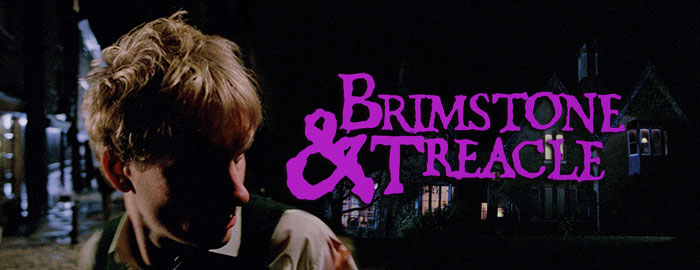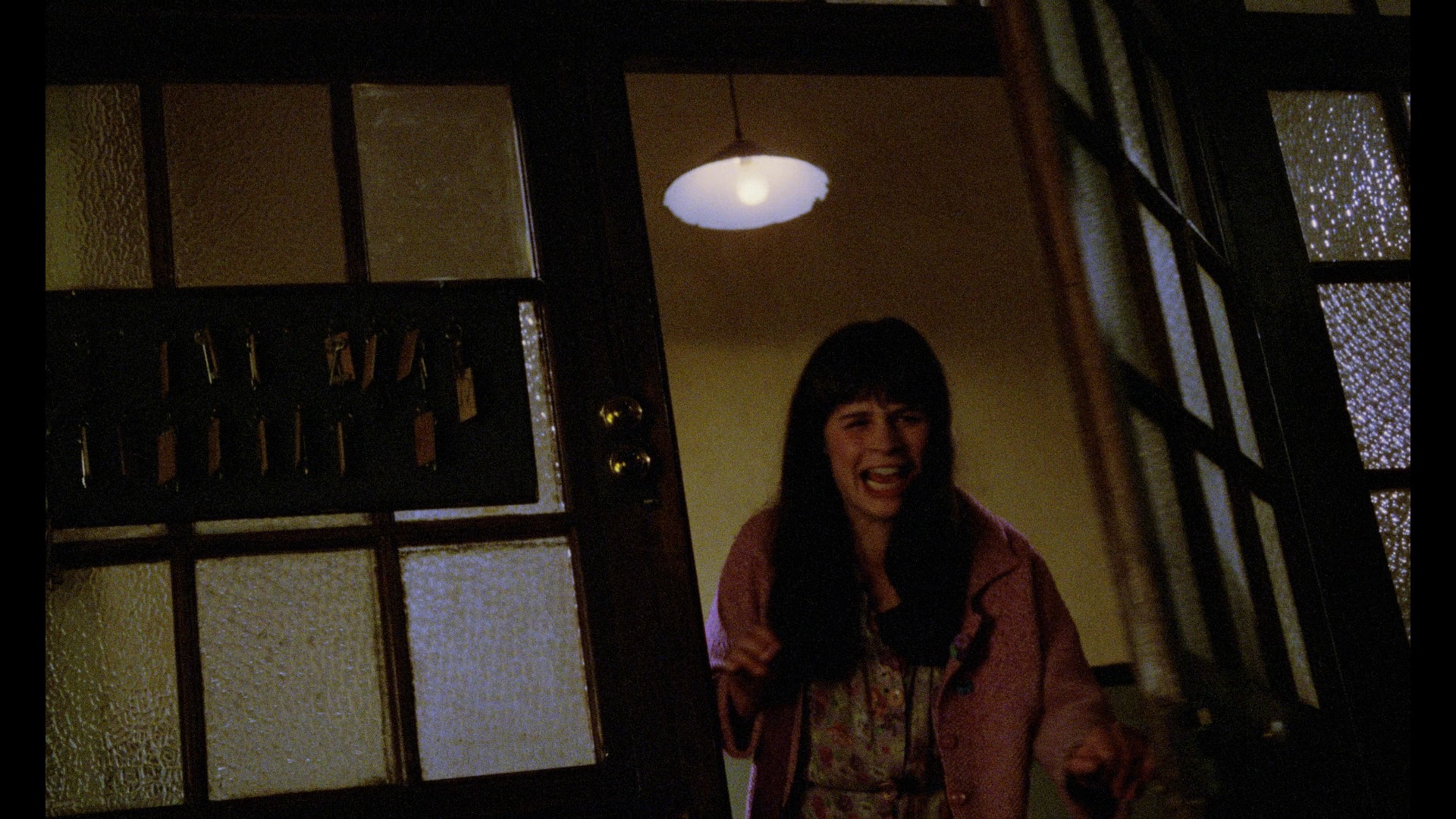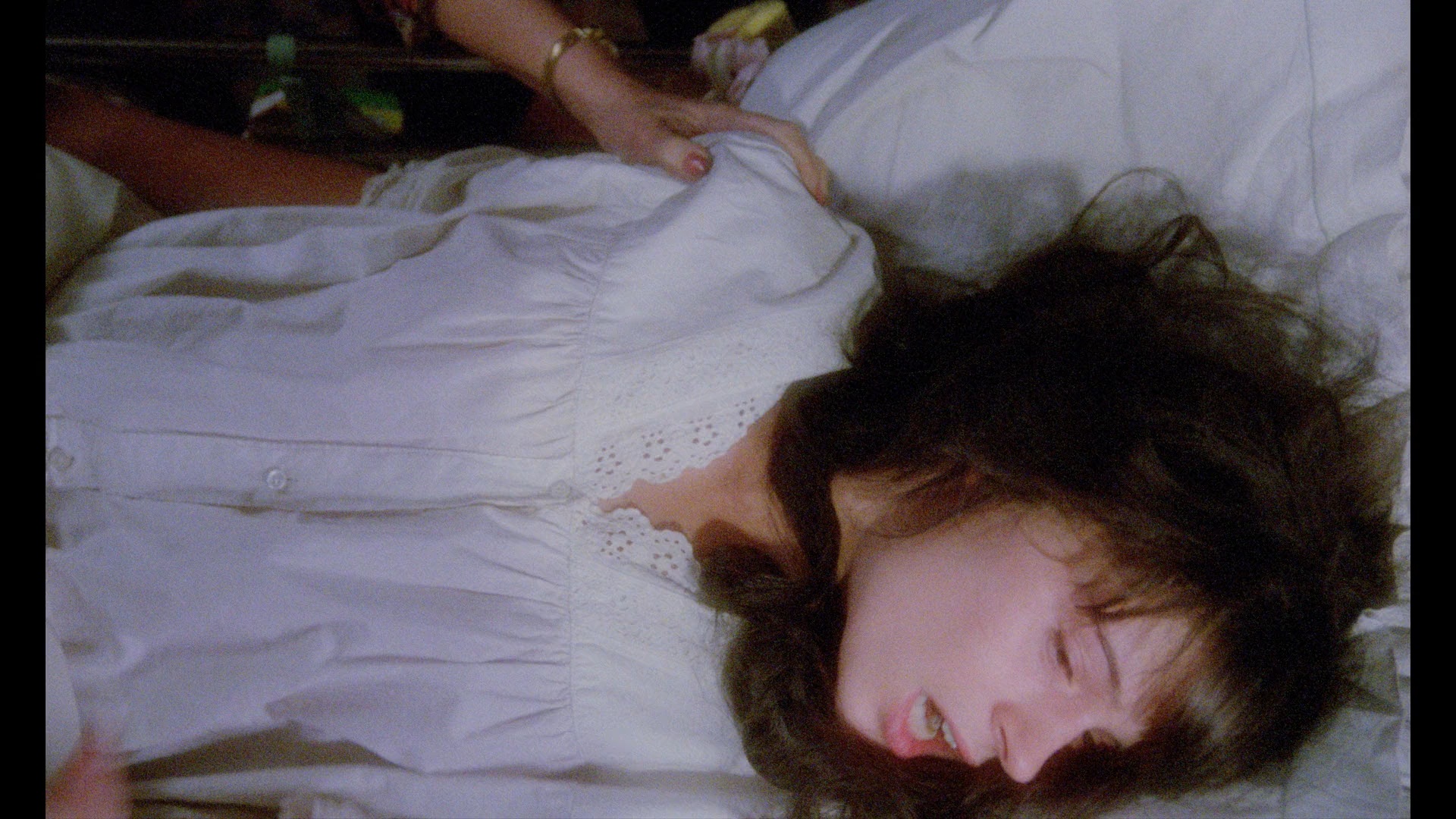

 cult films from the early '80s, Brimstone and Treacle was adapted by Dennis Potter (Pennies from Heaven) from his
cult films from the early '80s, Brimstone and Treacle was adapted by Dennis Potter (Pennies from Heaven) from his  own controversial, once-banned 1976 television play. Potter was becoming quite a name in both the U.K. and the U.S. thanks to his outstanding TV work including the acclaimed 1978 miniseries Pennies from Heaven, which became a splashy and highly disturbing Hollywood film in 1981; he would soar to even greater heights of recognition soon after in 1986 with another miniseries, The Singing Detective, though that wouldn't become a feature until 2003. Thanks to the presence of pop star Sting (semi-fresh from his first big role in Quadrophenia) and a host of solid British actors, this film is truly unlike any other and deserves more than the general oblivion it found after a few years.
own controversial, once-banned 1976 television play. Potter was becoming quite a name in both the U.K. and the U.S. thanks to his outstanding TV work including the acclaimed 1978 miniseries Pennies from Heaven, which became a splashy and highly disturbing Hollywood film in 1981; he would soar to even greater heights of recognition soon after in 1986 with another miniseries, The Singing Detective, though that wouldn't become a feature until 2003. Thanks to the presence of pop star Sting (semi-fresh from his first big role in Quadrophenia) and a host of solid British actors, this film is truly unlike any other and deserves more than the general oblivion it found after a few years. advantage here, with the twisted and funny last scene (which diverges from the more overtly Satanic TV version) causing the viewer to look back on all of the preceding events with a nasty chuckle.
advantage here, with the twisted and funny last scene (which diverges from the more overtly Satanic TV version) causing the viewer to look back on all of the preceding events with a nasty chuckle.  The entire concept of evil deeds begetting divine results probably won't turn up on the big screen anytime soon in our current climate, so it's a good thing Potter's typically sharp and witty pen drove the point home with skill when he did. Mention must also be made of the eerie, striking music score, composed by Sting with a little help from Michael Nyman (and judicious pop songs by The Police and The Go-Gos).
The entire concept of evil deeds begetting divine results probably won't turn up on the big screen anytime soon in our current climate, so it's a good thing Potter's typically sharp and witty pen drove the point home with skill when he did. Mention must also be made of the eerie, striking music score, composed by Sting with a little help from Michael Nyman (and judicious pop songs by The Police and The Go-Gos). scenes but which was dialed back erroneously on past home video editions. The UHD features HDR10-compatible Dolby Vision and looks very striking in motion with a luminous appearance that's quite a jump from the drab look we've had for decades. The DTS-HD MA English 2.0
scenes but which was dialed back erroneously on past home video editions. The UHD features HDR10-compatible Dolby Vision and looks very striking in motion with a luminous appearance that's quite a jump from the drab look we've had for decades. The DTS-HD MA English 2.0  stereo audio is an accurate representation of the original mix, with the usual strong channel separation during the music passages; optional English SDH subtitles are provided. A select-scene audio commentary (41m17s) with Sting and Loncraine is a light and casual conversation about their memories from the set, the influence of medieval mystery plays, the moral dilemmas of the story, the juggling of music gigs and acting by day, and the challenges of the more physical scenes like that window jump. In "Trouble Brewing" (26m7s), Loncraine looks back at the more challenging aspects of dealing with Potter and his attitude to the audience, the reason he didn't take credit for some of his own writing, and his theories behind casting. In "A House for the Devil" (16m6s), production designer Milly Burns talks about she got into the business, her jobs on films like Jabberwocky, the biases against women in her profession in the '70s, her pregnancy while working on this film, and the story's themes woven into the creation of the house interior. "Big Visions and Small Screens: Dennis Potter on Film" (22m51s) features separate discussions by Jon Dear and John Williams about the multiple big screen interpretations of the oft-ailing Potter's work mentioned above, with a particular focus on the background behind this film and its source TV version which was originally supposed to be part of a Potter trilogy before the hammer came down hard and paved the way for both version of Pennies from Heaven. The original trailer is also included.
stereo audio is an accurate representation of the original mix, with the usual strong channel separation during the music passages; optional English SDH subtitles are provided. A select-scene audio commentary (41m17s) with Sting and Loncraine is a light and casual conversation about their memories from the set, the influence of medieval mystery plays, the moral dilemmas of the story, the juggling of music gigs and acting by day, and the challenges of the more physical scenes like that window jump. In "Trouble Brewing" (26m7s), Loncraine looks back at the more challenging aspects of dealing with Potter and his attitude to the audience, the reason he didn't take credit for some of his own writing, and his theories behind casting. In "A House for the Devil" (16m6s), production designer Milly Burns talks about she got into the business, her jobs on films like Jabberwocky, the biases against women in her profession in the '70s, her pregnancy while working on this film, and the story's themes woven into the creation of the house interior. "Big Visions and Small Screens: Dennis Potter on Film" (22m51s) features separate discussions by Jon Dear and John Williams about the multiple big screen interpretations of the oft-ailing Potter's work mentioned above, with a particular focus on the background behind this film and its source TV version which was originally supposed to be part of a Potter trilogy before the hammer came down hard and paved the way for both version of Pennies from Heaven. The original trailer is also included.![]()